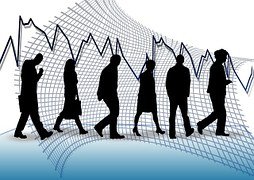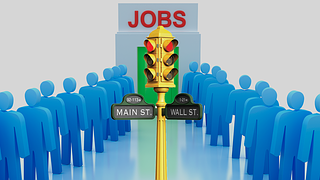More Jobs! Yeah - Right
So there I was, happy as Larry, minding my own business with the radio on when on comes one of those politician fella's, and he starts rabbiting on about all the jobs him and his buddies are going to create for us poor citizens.
Well my skin began to crawl listenin' to him and I felt the anger bubblin' up so I popped a few blood pressure pills and washed them down with a drop of the quare stuff as quick as I could.
What is it that Marley fella said? 'a sober man is an angry man'. Well, something like that anyway.
It's not as if I hadn't heard it all before - but I had a pounding headache and I was in no mood for this old crapology.
What makes it worse is that I know people buy into this stuff.
See here's the thing

Hear That Train A Commin'
While technology should be the light at the end of the tunnel - for most of us it’s the light of an oncoming train it's coming and its coming fast - and although the whistle is blowing - its warning is not being heeded.
The march of technology is radically reducing employment rates across the world and given that wealth distribution is through the exchange of labour for income - reductions in the number of jobs available means that more people will be cut out of the main wealth distribution system available to the unwashed masses.
Something that can improve our lives tremendously is the very thing that threatens us most. To be fair - it is not actually the technology that threatens us.
So What Is It?
But Technology Creates New Jobs ….
This is the old argument.
Technology - while it may replace some jobs, it also creates lots of new jobs. Bullshit.
There was a time when this logic had some value, but the reality is that we are already replacing jobs with technology at a greater rate than we are creating new jobs and the pace of jobs being replaced is accelerating.
What Types Of Jobs Are Threatened?
Many traditional jobs have already become obsolete, but for those of you who think you are irreplaceable - think again.
There are very few jobs that will not be threatened to a greater or lesser extent in the coming years and it does look as if most jobs can be dispensed with over the long term. In other words, most job sectors will be affected.
This video should an eye-opener for any of you who believe their jobs are safe indefinitely
<iframe width="560" height="315" src="
The Myth Of Full Employment
What we mean by full employment is that there's job for everyone who wants to work and is able to work.
Now while the expectation of full employment may be unrealistic, the theory, according to economists and politicians is that the closer a society can get to full employment the better. This is how it goes. When there are more jobs available there is an improvement in the economy and when there is an improvement in the economy more jobs become available, right?

We Want Jobs!
Therefore when unemployment rises, people will turn to their elected representatives to 'do something about it'.
Whether or not a politician is seen to be doing something or perceived to be doing something can have a huge impact on votes. This is why you will hear politicians talk about 'creating jobs' and 'improving economic circumstances'.
Yes, you may have improvement when a large company sets up in the locale. It's great for the local economy, for employment and it's a boost for the local politician.
Yes, when there is an improvement in the local economy overall it can lead to some 'trickle down'. However, the notion of maintaining or improving employment levels over the long term just ain’t going to happen.
Do our politicians realise this, but just don't want to be the ones to say it?
The Dilemmas of Our Time
We are facing two major issues as a species that are going to dramatically change the future of the world as we know it.
The obvious one is the ecological destruction of the planet - but that's a story for another day.
The second is social inequity.
The gap between the Have's and the Have not's is increasing and the amount of Have not's is also on the increase. This is not an opinion - this is fact and there is ample evidence to prove it.

Given that employment is our access to what we need to survive - as technology increasingly replaces humans - more of us will have to find other ways to create income or we will find ourselves in deep shit.
Most of us will end up in the latter camp.
Of course, this leads to another dilemma.
There is an old story about when Henry Ford toured his newly automated plant with union leader Walter Reuther - he said 'Walter, how are you going to get these robots to pay union dues?'
Walter replied 'Henry, how are you going to get these robots to buy your cars?'
Global Economics

The dominant global economic paradigm of our time is that if you want to stay in business you need to stay competitive and make a profit.
Reducing costs is one way to achieve this. There are significant costs attached to hiring workers - especially if they are to be paid a decent living wage. As technology improves and becomes more affordable, business will inevitably choose to reduce their expensive reliance on humans by investing in more cost effective technology.
So What Happens When There Are Less Jobs?
- Tax revenue from workers income falls
- Welfare demands go up Ability of the state to pay for welfare becomes a problem
- Demands for goods falls – and consumption is the bedrock of global economics
Something has to give
The irony of the situation is that although technology will allow us to create more wealth and abundance, fewer and fewer people will be able to share that abundance if we continue on our current path.
The Ostrich Approach

We are not prepared for the changes that are coming and it doesn't look like anyone in a leadership position is willing to bite the bullet on this.
Is this is due to lack of awareness of the issues or could it be a case of bury our heads and hope that everything will be alright on the day?
Is this a political hot potato that our politicians don't want to broach?
Will ignoring the issue make it go away? I think not.
Facing Reality
You don't need to be Nostradamus to predict that improving technology is going to replace jobs and it will never create new jobs at anywhere near the rate it will replace them.
There is already social upheaval across the world due unemployment, economic instability, coupled with massive income inequality.
This train is coming and it's how we deal with it that's going to ultimately determine the outcome.
Our current economic philosophy doesn’t serve society as a whole and there are powerful vested interests who don't want to change the status quo.
Our so-called 'political representatives' won’t rock the boat. Beyond their sugar-coated rhetoric and sound bites, they have little or nothing to offer.
So when I hear politicians bleating about creating jobs my skin crawls. Surely they know that they are selling a lie?
The Fundamentals Of Wealth Distribution

The fundamentals of wealth distribution as we the unwashed masses know it - is through the exchange of labour for a share in created wealth.
If you don't work you don't get a share - it's as simple as that.
Depending on what country you live in you may be lucky enough to get welfare which is some help. If you don’t live in a country where welfare is available – toughsky shitsky.
The bottom line is that you are probably going to have to work for a living or you will be hard pressed to survive.
This fundamental principle is something we all grew up with, to the point where it is pretty much embedded in our psyche. When you finish school or college you’ve got to go out and work for a living.
Yes, there are other ways to carve out a living, but by and large, for most of us - our income comes through the exchange of labour for income - unless of course you are born into wealth.
This Fundamental Principle Will Not Work in the Future. In fact, it’s already past its sell by date.
'and the needle goes back to the start of the song and we all sing along like before'

Now where's that bloody bottle gone!!
Let me ask you something: what you think of the law of diminishing marginal utility? Imagine Ford employed machines exclusively. The idea is that each car Ford produces adds fewer and fewer to his wealth, for what good is one more car you cannot drive? So he sells his cars, but he can only sell for as much as people can afford, and with so many cars on the market, this is quite low.
Ford cannot charge any more than what's offered, so the only thing he can do is accept whatever he finds more valuable among the things offered. It may be that an automated car becomes so cheap it can by exchanged for something trivial (let's call future service X), because the car has no value but to be exchanged.
This process should cause a natural equilibrium in the supply, demand and cost of cars.
Don't you find this argument at all convincing? Why?
Thanks for asking.
I don't think of the law of diminishing marginal utility at all. Never heard of it 'til you asked me. I'm neither an economist nor an intellectual nor do I want to be, but I get what you're saying, though only in terms of how this law purportedly works.
What is this 'argument' that 'this process should cause a natural equilibrium in the supply, demand and cost of cars' suppose to convince me of?
The point of the post is that income for labour is a social tenet that most of us just take for granted and accept. However, jobs are being replaced by technology and the time is not so far away when the demand for labour will be a fraction of what is was when this tenet had some validity.
The upshot is that (in my opinion) we will need to restructure how we think about labour as the primary source of income for the majority, if society is to meet the needs of our new situation and we need to do it fast.
Yet most politicians are still talking about creating jobs at a time when in the long term, that direction has lost validity.
Yeah, I wasn't very clear. Let me try again.
Some centuries ago, 90% of the population worked in agriculture. Food was scarce and traded for things people would find essential. For example, a farmer might not exchange his hard earned food for a haircut or tatoo art. Then mechanization came and people migrated to cities. Only 10% work on agriculture now, but the output of agriculture is greater than ever. This made food so cheap, compared to then, that farmers are willing to trade them for things that would seem futile before. Today, most of us have plenty of food and many have professions that could not be dreamed of before.
The point is that the elite, so to speak, cannot consume what they produce. Even if Ford could produce cars for a penny each, it would only be worth his while in order to trade for whatever it is we're producing. He needs us. The economy never depended on us having jobs, but on people producing whatever the others want in exchange for the things they want.
There's an old story that an American economist was visiting China and saw a group of people digging a trench with shovels. He asked "Wouldn't it be more effective to use an excavator"? To which they answered "Look at all these people. If we used an excavator, all of them would lose their jobs." The economist then argued "If that's the goal, why don't you get even more people to dig with bare hands"? Well, that's how I remember it, anyway.
No worries my man.
And here's the thing. I agree with your points and I'm 100% for technology and 100% for replacing jobs with technology.
Give me the excavator anytime so I can go elsewhere and do something worthwhile.
The issue as I see it is that we are not prepared for a transition to a society where there is a lot less labour required to produce what we need.
We (the average Joe's and Josephines) are telling our politicians that we want jobs because to us jobs means income. Politicians are promising us jobs because they want votes.
The fact is, that what we really want is the ability to keep a roof over our heads and do the best we can for our kids but we live in a society where to do this you must have a job (I'm generalising)- and I think we both agree that digging holes with our bare hands is not a
solution.
Being able to buy a brand new Tesla for $5000 doesn't matter to an unemployed man trying to raise a family if he is struggling to get $500 to pay his rent or mortgage and put food on the table.
Yes, I see. You're absolutely right.
Transitions like this aren't easy in the best of cases. It worries me that government, in trying to produce these jobs, will tinker with the economy and do more harm than good. It is easy for them to produce sudden economic growths through bubbles that will eventually burst. Some argue that the immediateness intrinsic of democracy (which revolves around re-elections) makes this system particularly vulnerable to this.
Congratulations @mcwhackery! You have received a personal award!
Click on the badge to view your Board of Honor.
Do not miss the last post from @steemitboard:
Congratulations @mcwhackery! You received a personal award!
You can view your badges on your Steem Board and compare to others on the Steem Ranking
Vote for @Steemitboard as a witness to get one more award and increased upvotes!